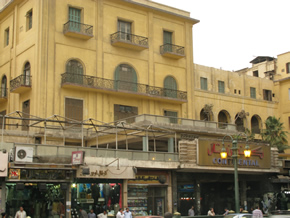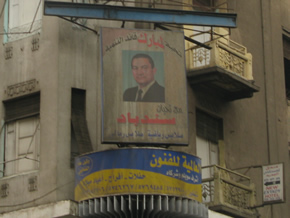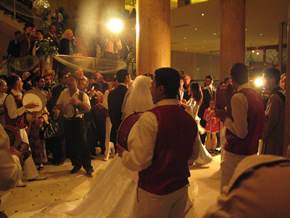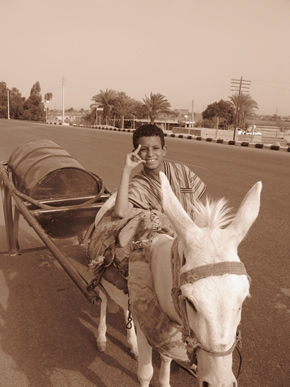29 January 2011

Cairo, 5 April 2008
I visited Egypt back in 2008. It's hard to believe it's been almost three years already. My journal for the trip is still a long way from complete; it's barely started, actually.
It was one of the most exhilirating and frustrating trips I've ever taken.
I visited the Pyramids of Giza on my birthday - and two other times, for that matter. I couldn't get enough. I still tear up when thinking about the pure, awesome adventure of renting a bicycle and making my way from the Nile to the Valley of the Kings. Incredible. There was Howard Carter's house on the hillside. There was King Tut himself, back right where he belonged, in his tomb.

The Grand Continental:
Lawrence of Arabia's Cairo "home" (1914-1915)

A poster of Pres. Mubarak in Cairo

A wedding party in Cairo

A young entrepreneur,
outskirts of Luxor
But I also remember the frustration of constantly being hounded by people who wanted to sell me "genuine" papyrus and sundry body lotions. They couldn't understand my lack of interest. It got to the point where "Egyptian hospitality," which involved a free serving of Egyptian whiskey (Coca-Cola), was tendered only so long as I expressed interest in making a purchase. If there was no deal, well, then that free Coke was no longer free. That's to say nothing of the constant push for more-than-generous tips for any and every little thing. And there was that horrid, repugnant taxi driver in Cairo.
Then again, there were the drivers who spent an exorbitant amount of time whisking me around from place to place, taking me all the way out to Saqqara and over to Giza, patiently waiting while I indulged my archaeological passions. And driving through all that ungodly traffic.
I upset those whom I didn't tip enough, and I also upset others who thought I tipped too generously those who helped me tremendously.
I understand life in Egypt's not easy. Far from it.
Indeed, it's crushing to think the wave of rallies and protests currently gripping the region at large started with one down-and-out vendor in Tunisia, a 26-year-old man with a university degree, working well below his station, who had been kicked to the curb by his own government one time too many. Mohamed Bouazizi set himself on fire in late December 2010 and died on 4 Jan. 2011. The embers of that personal revolution have now spread.
While walking through a particularly run-down part of Luxor, with children running around and playing in the dusty streets, I couldn't help but contemplate how the Playstation 3 sitting at home cost more than some Egyptians make in an ENTIRE YEAR, and it simply wouldn't be affordable for many more.
So, yes, there was frustration borne of the financial gulf, but there was also bonding.
Bonding in the fundamental knowledge that Egypt is the cradle of civilization and the history there is unmatched anywhere else in the world.
My guide/driver in Luxor was from Sudan and he was a genuine delight to be around. When I first spoke with him on the phone, inquiring about making arrangements to get that bike and make it out to the Valleys of Kings and Queens, the first thing he said was, "You can call me Howard Carter."
Yeah. I get goosebumps, three years later, simply writing about that wonderful moment of new-found kinship.
Now Egypt is in turmoil. Riots and protests have swept the nation with one message ringing out loud and clear: President Hosni Mubarak must go. It's fascinating to read various media accounts of how the rally participants would take a break for evening prayers, but ultimately nothing is really all that sacred. Even the Eyptian Museum could not be spared from looting.
Looking back on my travels, I'm also thinking about my visit to Morocco. That was a culture shock for this kid who, at the time, was a freshly-minted college grad who had spent six months living in London and working as a fax boy at a corporate law firm.
Tangier and Marrakech were intense, as was the train ride in between. One guy threatened to kill me, there was a ridiculous "ransom" incident at a leather tanning factory, and a salesman who jabbed me in the back and told me to go after I let him know how resolute I was in not purchasing the wooden shoes of the Berber to match my Berber robe. That'd be one of two Berber robes I somehow, inexplicably purchased virtually against my own will.
There was also that whimsical run through the Marrakech market in which people called out to me, calling me "Berberman" and "Fish & Chips."
Ah. Those were good times, weren't they?
Then again, there I was on the rooftop of the Hotel Ali, overlooking the Marrakech market, fuming over all the nonsense this wet-behind-the-ears punk was being exposed to for the very first time.
And there was that other guy I met who was planning on meeting up with his father to do some sort of trek through the Sahara. But those plans were kiboshed. Algeria, Morocco's neighbor to the east, had just declared open hunting season on tourists.
The entire region is rich in culture and history. It's also constantly in some degree of turmoil.
Darfur. Timbuktu. Tunis. Sana'a. Cairo. Jerusalem. And so on.
The Green Revolution was a missed opportunity in Iran. At some point, though, something is bound to give. With peace and prosperity in the region, we can all go back to celebrating the land and the history that started it all. But there are some entrenched, long-standing forces at work that must be overcome.



